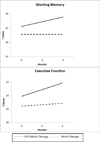A randomized controlled trial of cognitive remediation and work therapy in the early phase of substance use disorder recovery for older veterans: Neurocognitive and substance use outcomes
- PMID: 27732034
- PMCID: PMC5378626
- DOI: 10.1037/prj0000211
A randomized controlled trial of cognitive remediation and work therapy in the early phase of substance use disorder recovery for older veterans: Neurocognitive and substance use outcomes
Abstract
Objective: Cognitive remediation therapy (CRT) is reported to improve neurocognitive and substance use disorder (SUD) outcomes in residential treatments. This National Institute of Drug Abuse funded pilot study reports on CRT as an augmentation to outpatient treatment for SUD.
Method: Recovering outpatient veterans were randomized into CRT + Work Therapy (n = 24) or work therapy (n = 24) with treatment-as-usual. Blind assessments of neurocognition and substance use were performed at baseline, 3 months (end of treatment), and 6-month follow-up.
Results: Baseline assessments revealed high rates of cognitive impairment with 87.5% showing significant decline from premorbid IQ on at least 1 measure (median = 3/14 measures). Adherence to treatment was excellent. Follow-up rates were 95.7% at 3 months and 87.5% at 6 months. Mixed effects models of cognitive change over time revealed significant differences favoring CRT + Work Therapy on working memory (WM) and executive function indices. Global index of cognition showed a nonsignificant trend (effect size [ES] = .37) favoring CRT + Work Therapy. SUD outcomes were excellent for both conditions. CRT + Work Therapy had a mean of 97% days of abstinence at 3 months, 94% in the 30 days prior to 6-month follow-up, and 24/26 weeks of total abstinence; differences between conditions were not significant.
Conclusions and implications for practice: CRT was well accepted by outpatient veterans with SUDs and led to significant improvements in WM and executive functions beyond that of normal cognitive recovery. No difference between conditions was found for SUD outcomes, perhaps because work therapy obscured the benefits of CRT. (PsycINFO Database Record
Trial registration: ClinicalTrials.gov NCT01410110.
(c) 2017 APA, all rights reserved).
Figures


References
-
- Anaya C, Aran AM, Ayuso-Mateos JL, Wykes T, Vieta E, Scott J. A systematic review of cognitive remediation for schizo-affective and affective disorders. Journal of affective disorders. 2012;142(1):13–21. - PubMed
-
- Anton RF, O’Malley SS, Ciraulo DA, Cisler RA, Couper D, Donovan DM COMBINE Study Research Group. Combined pharmacotherapies and behavioral interventions for alcohol dependence: the COMBINE study: a randomized controlled trial. JAMA. 2006;295(17):2003–2017. - PubMed
-
- Bell MD, Bryson GJ, Greig TC, Fiszdon JM, Wexler BE. Neurocognitive enhancement therapy with work therapy: Productivity outcomes at 6- and 12-month follow-ups. Journal of Rehabilitation Research & Development. 2005;42(6):829–838. - PubMed
-
- Bell MD, Fiszdon JM, Greig TC, Wexler BE, Bryson G. Neurocognitive enhancement therapy with work therapy in schizophrenia: a six month follow-up of neuropsychological performance. Journal of Rehabilitation Research & Development. 2007;44(5):761–770. - PubMed
Publication types
MeSH terms
Associated data
Grants and funding
LinkOut - more resources
Full Text Sources
Other Literature Sources
Medical
Research Materials

